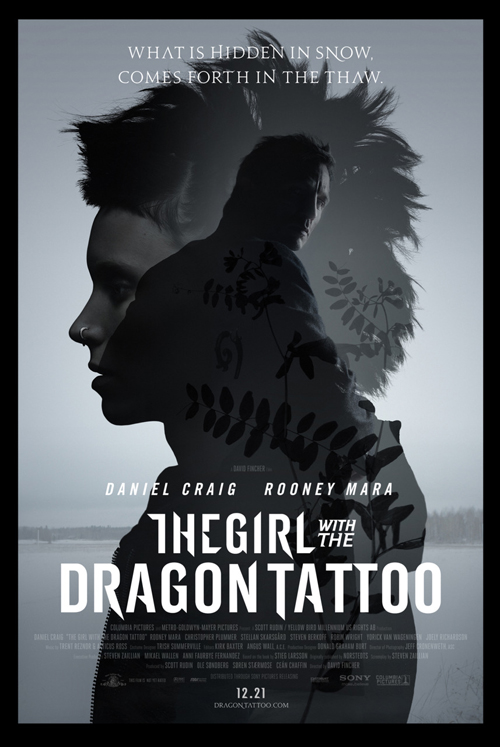 |
| Image source |
In Dragon Tattoo, Blomkvist is tasked with tracking down the murderer of Harriet Vanger, the niece of business tycoon and millionaire Henrik Vanger (Christopher Plummer). Blomkvist hires Salander as a research assistant and the two begin unraveling a story that turns out to be much more than a missing person's case. Blomkvist becomes uncomfortably familiar with the innerworkings of this family whose lineage contains more than its fair share of molesters, Nazis and other unsavory folks. He delves into the details of the fateful day when Harriet disappeared, trying to understand the events that led up to her supposed murder. Salander, a girl lacking normal social skills and mores, comes on as Blomkvist's research assistant. She is chosen for her expert hacking skills and almost obsessive attention to detail.
The casting information came with bursts of excitement as people buzzed about how they thought the choices lived up to their expectations. I've been underwhelmed by this series since its debut and I was actually looking forward to this installment as a Fincher, Craig and Mara fan. Unfortunately when the content isn't compelling no matter how much dressing up gets done to it, not much changes. For me, the most compelling part of the whole movie were the visually intriguing opening credits set to Trent Reznor's jarring score. I had hopes that it would be foreshadowing to a visually compelling film...unfortunately I was disappointed.
I must say that often times I feel like this story is like the Emperor's New Clothes - almost that I have to say I like it or else I'll be deemed some sort of idiot. But this is my blog and I'll say what I want. I don't like this series at all. I found the books boring, the writing style extraneous, and finally, I simply did not connect to the characters or even the story line. Of all the characters in this story, Salander is probably the most interesting, and her story isn't even fully explained until the second installment. Furthermore, she's billed as some kick-ass heroine who swoops in and saves the day. While there are some elements of that, it is definitely not the focus of the narrative. This film also does not highlight her hacking skills as much as it thinks it does and instead paints her more as an anti-social outcast with a history of being being abused by men.
To me the story feels forced, with the discoveries of each nuance of the mystery quite contrived. I don't believe that after Henrik spending 40 years and loads of money trying to uncover the mystery, Blomkvist is able to do so with relatively little effort. Furthermore, Larsson's writing style often contains extraneous sequences of irrelevant details and his narratives include scenes that are eventually unrelated to the overall plot, and unfortunately the movie did not do a good job of purging that information from the final project.
Additionally, and most frustrating for me, this film does not add anything to the cinematic landscape. I'm not sure exactly what I was expecting with this movie, but I think it should have offered something new. This feels like they might as well have dubbed over the original movie with English voice-overs. The Swedish movie, while not perfect, offered a visual glimpse into the world Larsson created. The American version pretty much duplicated it down to the color palate the film was shot in. Interestingly though, this film was more violent and contained more graphic nudity than the Swedish version, a surprising turn for Hollywood, more often known for sanitizing its subject matters. Moreover, the film and story claims to be a lot about female empowerment, as Blomkvist convinced Lisbeth to help him by telling her that they'd be catching "a killer of women." Lisbeth is supposed to be an empowered female as well, but her greatest moments of badass-itude are uncontextualized and float in the story totally unconnected to the rest of the plot, this being the fault of either Larsson or director David Fincher.
What I did find impressive about the story after reading the book and seeing two film versions is just how attentive to details Larsson was when it came to constructing his narrative. The entirety of the mystery relies on the unraveling of details based on photographs - a visual medium. As an author, he needed to create vivid images for the reader to understand how the mystery unfolded. The task of the filmmaker is much simpler, presenting the visuals directly to the viewer. Ironically, the story works better as a novel as it allows the the viewer to take a more active role in understanding the story. So it is interesting that a story which relies so heavily on visual components actually works better in the written form as opposed to a visual one.
So here it is, my declaration of dislike for this series. I know I am going against the grain of almost every media outlet and critic out there, but here it is. I see the Emperor and he's not wearing any clothes.
No comments:
Post a Comment